Cuba: a lingering anachronism
On visiting Cuba, my inherited anti-communism tested, what I experienced, and what is going to possibly happen there
Tourism is the life support system on which the Cuban regime relies to perpetuate its existence. It brings in much needed foreign currency that allows it to somewhat mitigate the punishing sanctions regime that was put in place against the island decades ago by the USA.
Canadian citizens (and many Europeans) have long been vacationing in Cuba as it provides a cheaper alternative, alongside the Dominican Republic, to more expensive Caribbean getaways like the Bahamas or the UK/US Virgin Islands. Package tours are the rule, where those from the Great White North are shepherded to large resorts where most of these middle class tourists rarely venture away from. Everything is paid for in advance: accomodations, food and drink. Shows are put on every evening, disco/nightclubs are available in the near vicinity, and daytime is full of activities led by government employees who make sure to cheer the revolution as they toss the first volleyball your way. It’s a rather tightly controlled scene, but not too tightly.
There are those who will wander off of the resort to scope out the local scene. Bands will play on street corners where they can earn money from generous tourists. Sometimes you’ll run into a street party where you will be safe as houses as the Cuban Government will come down hard on anybody lifting a finger to harm their prized tourist assets.
Families will sometimes be invited to the homes of hotel employees who quitely offer them up a dinner, usually lobster, for $10-15 USD per head. Many of these hotel employees will be engineers, doctors, or lawyers who find that they can supplement their income this way and surpass in earnings what they would receive if they stayed in their field of study.
Many men will avail themselves to prostitution which is rife in resort towns. These prostitutes will often have fixers who act as go betweens, pairing up the hookers who will wait outside of the nightclubs with horny western johns.
Older western women will prey on hotel employees for sex (I saw this quite a bit). Some will pay young men for their services, others will gladly do it for free. Very often these men will have several different women sponsoring them every season, hoping that at least one is his ticket out of Cuba for a chance of life in the West.
Others still will find love. I know of a dozen men from Canada who found their wives there and brought them back north with them. Each relationship is different, but what they all have in common are two things:
the male’s preference for non-Canadian women (often divorced from wives that they had in Canada)
the female’s desire to escape Cuba for a brand new life
I first visited Cuba almost twenty years ago when I went on vacation to Varadero (a very, very popular destination) with two females that I knew from university. I vaguely recall the run down airport but very much recall the noticeable absence of advertisements everywhere. Being from a reflexively anti-communist family, I had my eyes wide open, trying to absorb everything and taking as many mental notes as possible. Old, old cars, very little modernization that could be compared to turn of the millennium North America, it was as if Cuba was stuck in the 1950s.
The hour long drive to Varadero from Havana took you past plantations, mainly tobacco (if my memory is correct), to the seaside resort town. In comes the western tourists, off I go to the beach. All of us are assigned a hotel staff employee who runs our activities, mine a very cheerful and chubby mulatta.
Setting up our beach volleyball game, the staff are pleased that I am from the former Yugoslavia (they had no idea what Croatia is, so I had to default to the ex-YU), and they christened me “Tito” during the course of my stay. Despite the old pig being dead for over two decades, his Non-Aligned Bloc legacy persisted in Cuba, where his buddy Fidel Castro was still alive and running things. I didn’t mind as they didn’t mean any harm by it and it would be too annoying to explain why I wasn’t fond of it. Plus, I was a guest in their country and trying to explain being an anti-communist to communists in a police state is a dick move that could have resulted in everyone getting into trouble. When in Rome……
Cuban food is bland, but Cuban women can dance like no other women that I have ever seen since. It’s all in the hips, and those hips mesmerize.
I managed to sit still on the beach at the resort for two whole days before my wanderlust kicked in and my natural anthropological urges came to the fore. I immediately noticed that it was impossible to gain the confidence of any of the Cubans, as the punishment of losing such a plum gig as resort employee was not worth making friends with the tourists who come and go.
I then proceeded to venture out further and further, in concentric half-circles, to explore the region. Running into a very large street party of locals at 2am, with Cubans of all colours, shapes and sizes, and me being the only tourist, I was struck by how little self-segregation there was along racial lines. Was this an anomaly? A one-off? Or does universal poverty reduce racial friction? That question has stuck with me for some time.
Signs of the police state are everywhere. The greatest brand is, of course, Che Guevara. His visage is plastered all over the place, a welcome martyr who went on a mission to evangelize Marxism and spread revolution in South America, and who was caught and executed, possibly to the delight of the Castros who many suggest viewed him as either a liablity or threat.
Turn on the TV in the hotel room and one could watch a 3 hour speech delivered by a Cuban Communist Youth Party member on the subject of this year’s tobacco crop and how they are continuing to build socialism. Go off the resort and into town and see cops sitting on the hoods of their cars, parked strategically at street corners. Who are they watching? Everyone, it seemed.
There was no sense of a regime about to collapse, but I constantly wondered to myself how they could continue to exist in a post-Cold War World, where Soviet subsidies were a thing of the past? Mass tourism seemed to be doing the trick.
This was the post 9/11 era, but the triumphalist 90s still lingered in one’s mind. Democracy had to come. It was inevitable. Yet Cuba and its brand of socialism persisted.
Over the course of my several trips to Cuba, I developed an attachment to the land and to the people which is rather common for those who travel there. It’s a different world, a very different one. One cannot help but notice how life is slower and how people tend to smile a lot…but one cannot help but notice the grinding poverty as well. “Something has to give”, I thought. But it hasn’t….until possibly now.
After my first trip to Cuba ended, I contented myself with the thought that I was very, very glad to see the country before it would be turned into a giant Wal-Mart. Despite being a communist country, there was a charm in its culture, its people, its pace of life, its lack of advertisements, and its pride in spite of its material shortcomings. Did it cause me to second guess my opposition to communism? Not at all. But I did gain an appreciation for Cuba and for Cubans that has stayed with me ever since.
With the demonstrations that broke out there last week, I was stuck with trying to find reports and analyses of what is happening there and why it is happening, and that are as objective as possible. Western media outlets are largely useless as the overwhelming majority are now fully in line with regime change by the USA, while a tiny minority are leftist sites that fall into apologia for the regime.
Thankfully, Mike Tracey shared this piece on his Substack which I would like all of you who are interested in what is going on in Cuba to read. The author, a Cuban-American, lists the three major factors:
Economic Mismanagement by the Regime
Denial of Basic Rights
The US Embargo
My concern for Cuba is that an elimination of the regime would see a horrible transition to a market economy no different than that experienced by other post-communist states. A freefall in living standards, followed by a massive migration to the USA.
Nor do I think that Cuban emigres in Florida (and beyond) would easily set up shop in Cuba. One cannot help but notice how many communists in the former Eastern Bloc overnight became capitalists and lovers of liberal democracy. The ideologues were easily removed, and the opportunists and pragmatists quickly seized complete control over all governing structures and state-operated businesses. Why would Cuba in transition be any different? There must be a ton of party cadres and bureaucrats who are simply going through the motions and who can’t help but notice the regime’s stagnation and can’t wait for an opportune time to seize state assets to enrich themselves (and justify it to themselves as well).
The USA has shown that it is willing to work with ex-communists globally, provided that they serve US interests. I believe that Cuban emigres in the USA would be in for quite a shock as their raison d’etre would disappear overnight and their political leverage with both the GOP and Dems would vanish instantly as well if the communists stepped down in Havana.
Those of us familiar with communist regimes in their twilight will find this passage from the article very, very familiar:
Most Cubans want stability and economic improvement. They do not want to rock the boat as doing so risks what little they have. So they go through the motions, they publicly dedicate themselves to the 60 year old revolution while quietly whispering to others that it has to go.
On the US Embargo:
Like much of the world these days, Cuba is held hostage to US domestic politics. It is an absurd situation, but it is the reality. The embargo provides a permanent excuse for the failings of the regime, while allowing US Congressmen a show of force to gain the votes of Cuban emigres.
The politics of revenge:
“Cutting one’s own nose off to spite his face” is a common sentiment, and the author is right to note this being the case with Cuban emigres. They no longer live in Cuba and don’t have to deal with the negative aspects of the sanctions regime, but it hurts those that they care about at home. The emigres too are playing at a safe distance.
The author’s admitted split loyalties:
Ideally, it’d be up to Cubans to decide Cuba’s fate. But geography is geography and Cuba sits only 90 miles away from the USA. Uncle Sam is going to have a big say, and probably the final say, when this dying regime eventually meets its fate.

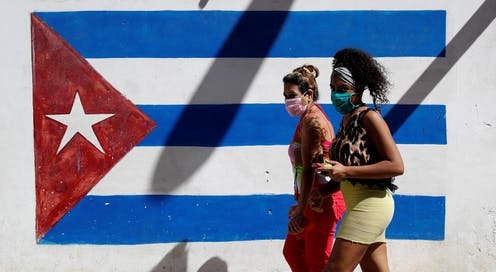



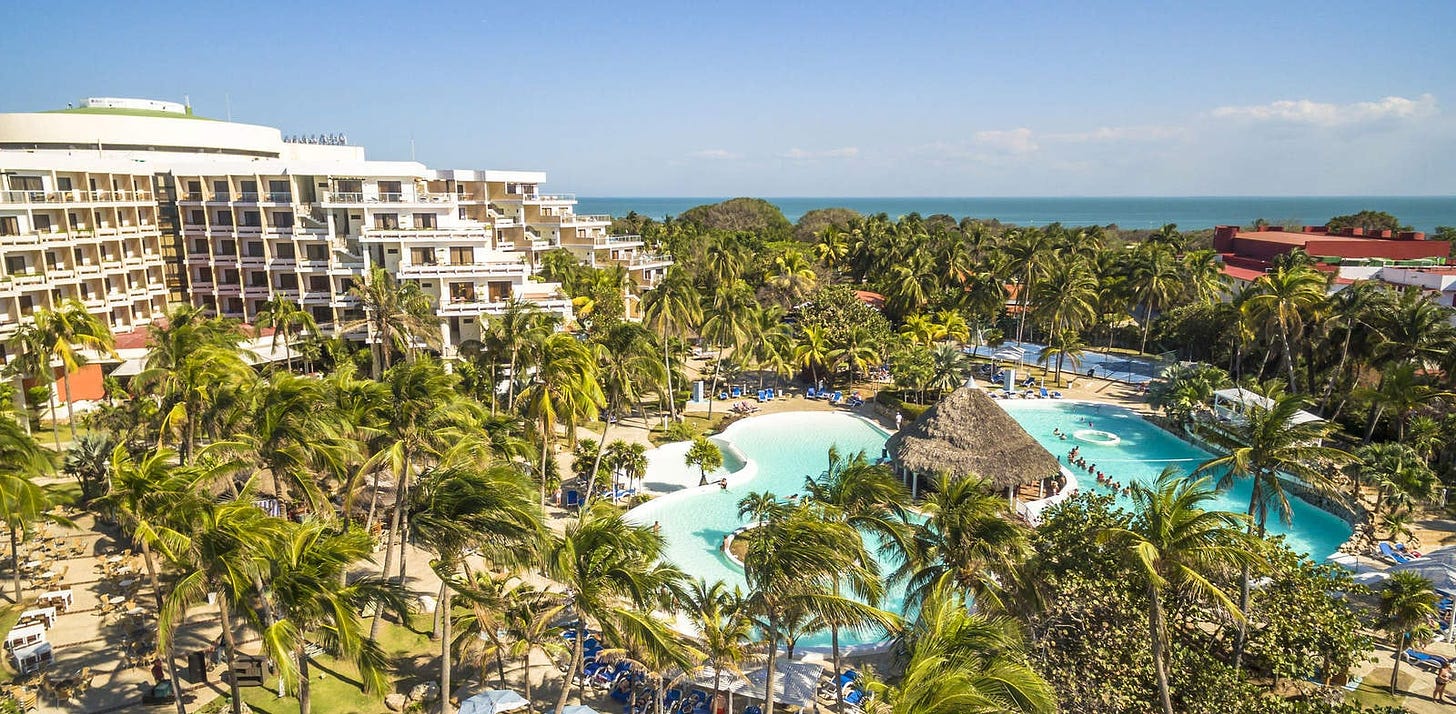

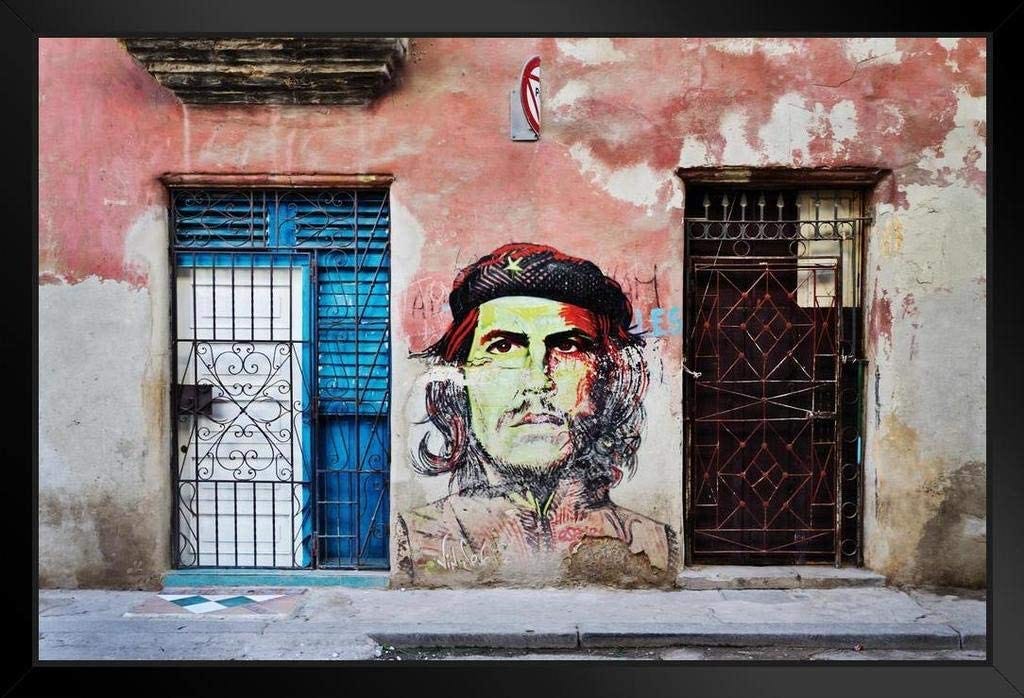
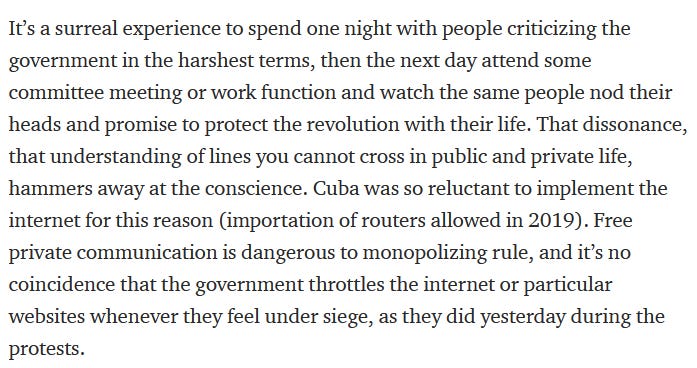
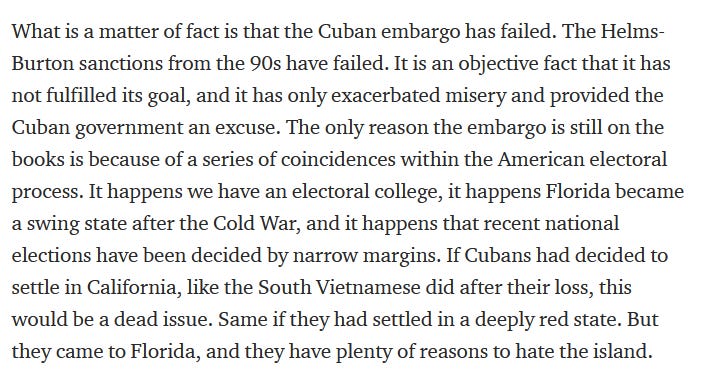
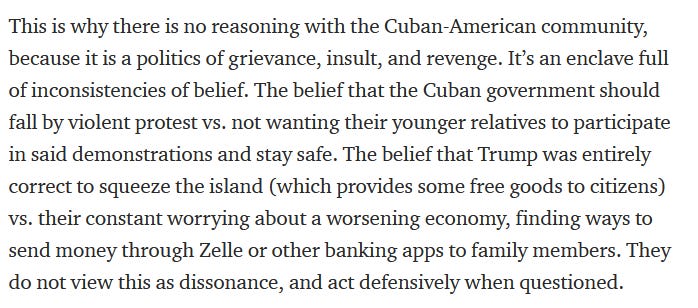
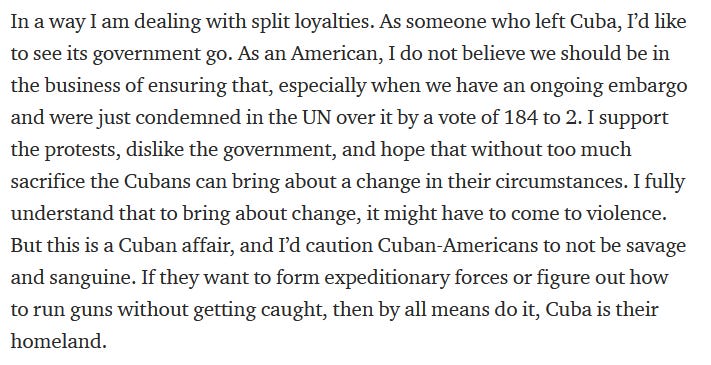
I visited Havana for about a week a few years ago. I did not enjoy myself. The poverty is grinding and eye opening. The entire experience is catered and artificial. The food is not varied. Prostitution is rampant, and it saddened me a great deal. The "pace of life" that Nic alludes to was (sorry to admit) deeply offensive to my Protestant sensibilities.
I enjoyed the jazz clubs, I will admit that. I also attended a baseball game, about which I could write a great deal. Cuban baseball is obscenely slow paced. The fans had an unfortunate affection for the vuvuzela.
Overall, I was struck by how frankly boring the place is. One gets the same impression from visiting ancient ruins. A sort of wistful nostalgia as you wonder what it must have been like when these glorious structures were actually built and maintained and bristling with activity. Alas, I can get a similar sense of torpor in my own backyard.
“does universal poverty reduce racial friction?”
In Essays Against Everything, Mark Greif said money is the solvent of identity. I wonder if Mark’s quote a lot and I think it’s a good answer to your question.